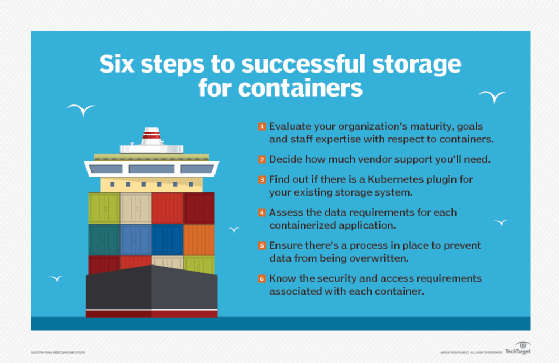
AndreasG - Fotolia
Container backup tips and trends for proper protection
You may need better backup for your container data. Take a look at top news and best practices for container protection, as that data could be critical.
Container backup is increasingly heading to the forefront.
The trend is a result of how popular container storage has become. Containers virtually package and isolate applications for deployment. They share access to an operating system kernel without the traditional need for virtual machines. Containers also don't consume as much space as virtual machines because each container shares the host's OS.
Containers are typically designed to exist only when needed, but the data may last longer. Much like other new(ish) types of storage such as SaaS, users are starting to understand that container data needs protection. Also similarly, as we've seen many new products devoted to SaaS data protection, products are launching that specifically tackle container backup.
As it is an emerging trend, there is still much for customers to learn about backing up containers. Here we provide some top tips, news and examples of products in the container backup world.
Why back up your container data?
First, why is container backup necessary? One major reason, as expert Chris Evans pointed out, is "application data must be more persistent than the lifetime of a single container." Therefore, with vendors adding persistence to containers, the data needs protection.
There isn't a one-size-fits-all backup platform, though, as it depends on the design of the container. Data in containers encompass several types of implementation: within the container, as a volume, as a bind mount or through a plugin. So, it's important to implement your backup accordingly.
Trends in containers lead to protection
Another reason why containers need backup is because some have shifted from stateless to stateful. Stateful applications store data, so they would need protection.
The question is, will containers replace VMs? As of now, the answer appears to be no. Analyst Marc Staimer said containers still don't have the security, flexibility and resilience of VMs.
But users are putting mission-critical applications on containers, which is increasing demand for backup and recovery capabilities. Containers, though, still need to mature as a technology and, as a result, so does container backup, so tread carefully.

Tips for Docker container backup
Container backup differs by product. With Docker being one of the top vehicles for containers, it's important to know best practices for that specific backup. As expert Brien Posey noted, one key is to keep track of version numbers -- restoring a backup of an older component can lead to issues.
Posey also advised Docker users to back everything up separately. In fact, Docker requires that you use separate backups for each component, including Swarm, Universal Control Plane and Docker Trusted Registry. Again, take care in your container backups, just as you would with other data backup.
Container protection products hit the market
In just the last year, several products have launched with container backup support. In some cases, veteran vendors have added container capabilities to long-standing backup products. For example, Veritas NetBackup and IBM Spectrum Protect Plus now support containers.
In other instances, products are devoted to the backup of containers. Portworx and Kasten are two newer companies with offerings that focus on Kubernetes. As Kasten puts it, the product is seeking to help with "Day 2" operations, which include mobility, backup and restore, and disaster recovery.
Kasten CEO Niraj Tolia said he thinks Kubernetes is "going to be the next VMware," as in, the next infrastructure of choice. Whether you agree or not, one thing is certain: Container backup is trending up.







